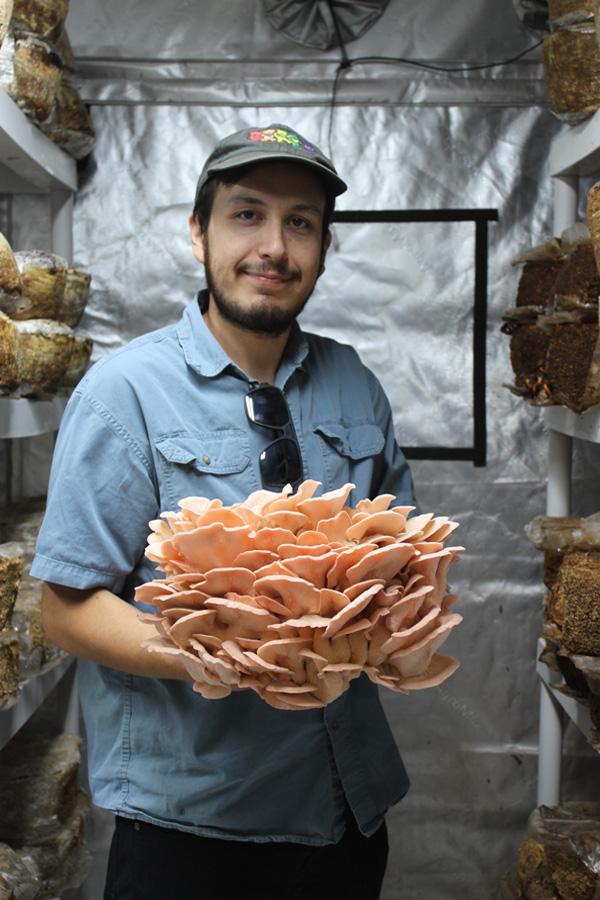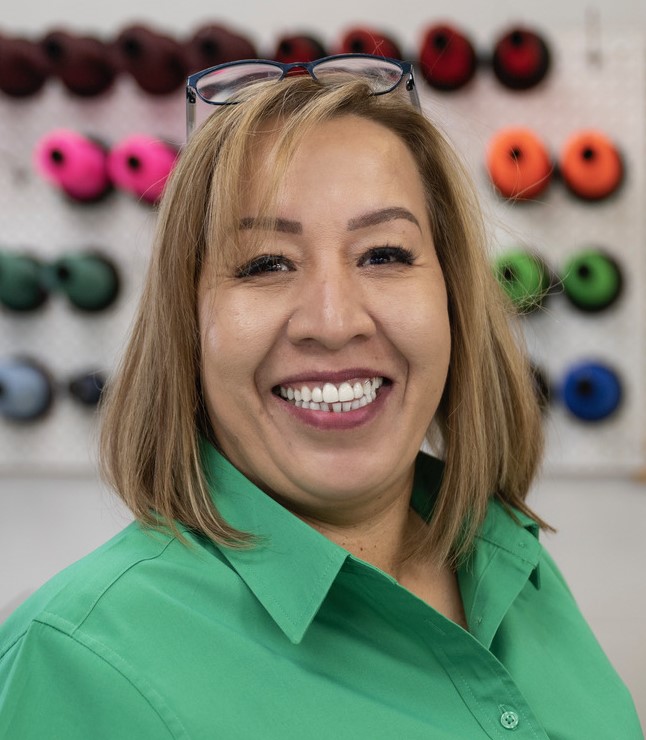The NMSBA program allows Los Alamos and Sandia national laboratories to apply their unique expertise and capabilities to help for-profit, New Mexico small businesses solve critical challenges. Technical assistance is provided at no cost to the businesses and is rendered in the form of laboratory staff time and incidental materials.
Continue readingTag Archives: small business loans
New Owners Put Silver City Tile Company on Path for Growth
Within two years of purchasing Syzygy Tile Works in Silver City, Josh and Carolyn White knew they needed to expand the business to meet national and international demand for their high-end, handcrafted ceramic tiles.
Josh had worked for the company for 16 years before the previous owner retired, and he quickly made improvements to shorten production times. But with employees needing as much as three years to fully learn their craft, customers were waiting four to five months for product delivery.
The Whites knew this was an unsustainable interval. In 2020, they contacted the state Economic Development Department to ask what resources were available to small manufacturers. They were referred to New Mexico Manufacturing Extension Partnership (New Mexico MEP), a nonprofit dedicated to helping small manufacturers streamline production and become more competitive.
Continue readingAn Investment of Operatic Proportions
Tony Zancanella has a lot of ideas and big plans when it comes to transforming old industrial buildings into places where art can flourish. As the director of Opera Southwest (OSW) in Albuquerque, he has been working for the past ten years to bring one vision in particular to fruition. That vision became a reality in September of 2022 with the purchase of the 11,500 s.f. former Spitzer Automotive warehouse on 3rd and Mountain, just north of the downtown area. The building will now function as the Opera’s technical production facility where a staff of skilled technicians and artists can work their magic creating the sets, props and costumes that are integral to the opera experience.
Tony’s energy, enthusiasm and focus are evident from the moment he starts speaking of OSW’s latest investment. “This space allows us to build our own sets right here in Albuquerque, whereas formerly we’ve had to contract with companies in Texas, New England, and California.” OSW, he emphasizes, is now poised to provide critical jobs for the production side of theater. “These are good jobs, interesting jobs that will bring economic diversity and opportunity for skilled workers to one of Albuquerque’s core historic neighborhoods.”
Continue readingShop Small Businesses This Saturday
Small Business Saturday — the Saturday after Thanksgiving — draws attention to the important role that independent merchants in New Mexico play in the local, state, and national economy.
Continue readingThe Loan Fund Helps Mycologist Cultivate a Business
Estevan Hernandez started growing mushrooms in his garage about 12 years ago while still in high school. It was an interest he developed after adopting a vegan diet.
Years later, after embarking on a career in electrical engineering, Hernandez decided to focus on his mushroom passion. He left his job, studied mycology under a master grower to become a Senior Mycologist, and opened an urban farm. He also turned to The Loan Fund, a nonprofit lender, for funds to help him start New Mexico Fungi, his Albuquerque business.
“I would probably still be working out of my garage, and I certainly wouldn’t be operating on the scale I am now,” said Hernandez.
New Mexico Fungi grows about a dozen mushroom species year-round using temperature-controlled incubators and rotating crops to produce Enoki, Chestnut, Lion’s Mane, Reishi, Shiitake, Shimeji, Turkey Tail, and several oyster varieties including black pearl, blue, golden, and pink. Harvesting about 140 pounds each week, the company meets the needs of customers searching for fresh produce and medicinal fungi, as well as commercial customers such as Vernon’s Speakeasy and Los Poblanos.
Continue readingA Loan Denial Can Be Beneficial
Getting turned down by a bank for a business loan may feel like failure and a personal rejection, but it is often the best thing that can happen to a business owner. Banks operate under strict regulations that don’t fit all situations. When the fit isn’t right, a good banker will refer the borrower to a Community Development Financial Institution (CDFI) that offers support services to increase the business’s odds of success. CDFIs are nonprofit organizations with advisors and consultants who work with borrowers to manage their businesses.
Joshua Smith, New Mexico Senior Vice President of Washington Federal Bank (WaFd Bank), regularly refers small businesses to CDFIs when they aren’t fully established or operational.
“Sometimes these folks don’t have entity documents, they don’t have articles of incorporation, they don’t have an EIN,” he said. That’s when Smith tells the customer, “Let’s get you partnered with a local small business support organization to get you to a point where you can come back to me.” Often, these support organizations are CDFI’s.
Continue readingSmall Steps and Passion Inspire ‘Pura Vida’
Buen Provecho Albuquerque is the only restaurant in New Mexico and one of only a handful in the United States that is 100% dedicated to “the taste of Pura Vida” — the flavors of Costa Rica. The restaurant, operating out of a charming space at El Vado open-air food hall in Albuquerque, is a labor of love for chef and owner Kattia Rojas. “Buen Provecho is my dream,” she says. “It’s my baby.”
Today, Kattia enlists 15 part-time staff to help her serve up to 400 plates a day from her restaurant, run a catering operation, and hand-roll tamales available for mail order across the country from a commissary kitchen. But in the beginning, it was just Kattia and her devoted husband and business partner, William, dishing out Costa Rican specialties at area farmers markets.
With a creative streak a mile wide and a zest for delighting her customers, she expanded her market menu week by week. “We started with tamales but then I said, ‘Oh! I think I can bring pastries.’ And then, ‘Oh! I think I can bring jams,’ and then ‘Oh! I think people will love my dessert.’ So by the end, I had like 30 different products in my little, tiny car,’” she laughs. “And every week was a task to load everything and go to market and come back with no space.”
Continue readingDoctors Need Capital Too
Martha Manquero-Butler witnessed firsthand the difficulties elderly patients face when trying to access health care. As a doctor at Texas Tech El Paso’s residency program, she helped by visiting patients where they were located instead of asking them to go to a clinic.
A few years later, with the support of family and savings, Manquero-Butler launched New Light Primary Care to bring the art and science of medical house calls to El Paso. It did not take long for the three-person practice to grow to 30+ employees who served more than 800 patients by 2017.
That’s when the El Paso Hispanic Chamber of Commerce referred Manquero-Butler to LiftFund, a Community Development Financial Institution (CDFI), for a commercial real estate loan that would help her acquire a building to serve as a base for staff and patients.
Continue readingGrowth Unlimited for Production Sewing Company
Veronica Fuller has been sewing for more than 40 years. It’s what she loves to do.
The owner of Sandia Pet Products migrated from Juarez, Mexico, 32 years ago and began working in sewing production facilities around Albuquerque, lending her expertise to manufacturing companies like Southwest Creations Collaborative, Marpac, and Sierra Peaks Corporation. In her off hours, she did custom sewing jobs from her garage. She made pillows, clothing, and more.
In 2022, Fuller’s employer at Sandia Pet Products was ready to retire from the 30-year-old business and turned to Fuller and another worker with an offer to buy the company.
Fuller’s colleague was not interested but Fuller jumped at the chance to take over the wholesale business that specialized in dog collars and leashes.
“I started asking questions and looking for loans,” said Fuller. “I asked [my former employer] Susan from Southwest Creations, ‘do you know of people I can borrow some money from? I’m a woman and I’m a Mexican.’” Fuller was directed to WESST, a business development organization that offers capital and technical assistance. “I called WESST and WESST gave me the loan.”
Continue readingLoan Officer Lauds Business Owners, Says ‘Entrepreneurs are Resourceful’
Angelina Romo believes small businesses in the central region of New Mexico are standing on their own again after the devastating effects of the pandemic. She should know. Romo is a loan officer with The Loan Fund, a nonprofit lender that offers loans and technical assistance to businesses and nonprofit organizations throughout the state. Romo serves the Community Development Financial Institution’s (CDFI’s) central region encompassing Albuquerque and surrounding areas.
“Many small businesses did a tremendous job learning to pivot with COVID limitations,” she said, citing clients who switched to selling sterilization items and protective gear or utilizing delivery services when they were unable to work directly with their customers.
Three years on, Romo sees businesses expanding their networks to achieve growth.
“Some of my independent trucking clients have even taken subcontracts with large corporations to ensure they continue to prosper,” she said. “Covid separated everyone for so long, but businesses have now banded together to continue growth and to survive.”
Continue reading







